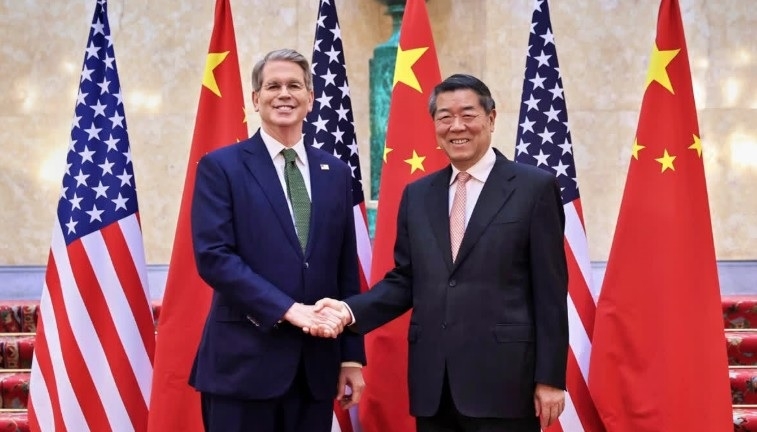Breakthrough In Tariff War: US, China Agree On Framework To Resolve Trade Disputes
Total Views |

London : Senior U.S. and Chinese negotiators have agreed
on a framework to get their trade negotiations back on track after a series of
disputes that threatened to derail them, both sides have said. The announcement
came at the end of two days of talks in the British capital that wrapped up
late Tuesday.
The meetings
appeared to focus on finding a way to resolve disputes over mineral and
technology exports that had shaken a fragile truce on trade reached in Geneva
last month. It’s not clear whether any progress was made on the more
fundamental differences over China’s sizeable trade surplus with the United
States. “First we had to get sort of the negativity out and now we can go
forward,” U.S. Commerce Secretary Howard Lutnick told reporters after the
meetings. Asian stock markets rose Wednesday after the agreement was announced.
The talks followed a phone call between President Donald
Trump and Chinese leader Xi Jinping last week to try to calm the waters. Li
Chenggang, a vice minister of commerce and China’s international trade
representative, said the two sides had agreed in principle on a framework for
implementing the consensus reached on the phone call and at the talks on
Geneva, the official Xinhua News Agency said.
Further details, including any plans for a potential
next round of talks, were not immediately available. Li and Wang Wentao,
China’s commerce minister, were part of the delegation led by Vice Premier He
Lifeng. They met with Lutnick, Treasury Secretary Scott Bessent and Trade
Representative Jamieson Greer at Lancaster House, a 200-year-old mansion near
Buckingham Palace.
Wendy Cutler, a former U.S. trade negotiator, said the
disputes had frittered away 30 of the 90 days the two sides have to try to
resolve their disputes.
They agreed in Geneva to a 90-day suspension of most of
the 100%-plus tariffs they had imposed on each other in an escalating trade war
that sparked fears of recession. The World Bank, citing a rise in trade
barriers, cut its projections Tuesday for U.S. and global economic growth this
year.
“The U.S. and China lost valuable time in restoring
their Geneva agreements,” said Cutler, now vice president at the Asia Society
Policy Institute. “Now, only sixty days remain to address issues of concern,
including unfair trade practices, excess capacity, transshipment and fentanyl.”
Since the Geneva talks, the U.S. and China have
exchanged angry words over advanced semiconductors that power artificial
intelligence, visas for Chinese students at American universities and rare
earth minerals that are vital to carmakers and other industries. China, the
world's biggest producer of rare earths, has signaled it may speed up the
issuing of export licenses for the elements. Beijing, in turn, wants the U.S.
to lift restrictions on Chinese access to the technology used to make advanced
semiconductors.
Lutnick said that resolving the rare earths issue is a
fundamental part of the agreed-upon framework, and that the U.S. will remove
measures it had imposed in response. He did not specify which measures. “When
they approve the licenses, then you should expect that our export
implementation will come down as well,” he said.
Cutler said it would be unprecedented for the U.S. to
negotiate on its export controls, which she described as an irritant that China
has been raising for nearly 20 years.
“By doing so, the U.S. has opened a door
for China to insist on adding export controls to future negotiating agendas,”
she said. In Washington, a federal appeals court agreed Tuesday to let the
government keep collecting tariffs that Trump has imposed not just on China but
also on other countries worldwide while the administration appeals a ruling
against his signature trade policy.
Trump said earlier that he wants to “open up China,” the
world’s dominant manufacturer, to U.S. products. “If we don’t open up China,
maybe we won’t do anything,” Trump said at the White House. “But we want to
open up China.”

